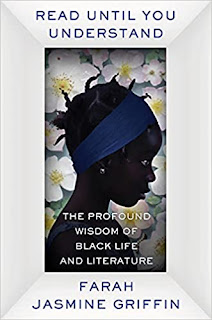Farah Jasmine Griffin is the author of the new book Read Until You Understand: The Profound Wisdom of Black Life and Literature. Her other books include Harlem Nocturne. She is the William B. Ransford Professor of English and Comparative Literature and was the inaugural chair of the African American and African Diaspora Studies Department at Columbia University. She lives in New York.
Q: Your new book's title comes from something your father, who passed away when you were 9, wrote to you. What does the phrase mean to you, and how would you describe his impact on your reading life?
A: At the time, I thought my father wanted me to read the book, remember the information it contained and return to it if necessary. I thought it must have been of great importance because he stressed how much he wanted me to understand it.
I later came to think of it as a process, to keep seeking information about Black history and to seek understanding in books.
My father was my earliest and most significant intellectual influence. I also read as much as I could about the things I knew he found interesting and important: African American history and culture, jazz, politics.
Q: You dedicated the book to Toni Morrison, and you write of first reading her novel Sula, “From here on, more than any scribe of the Old or New Testament, Morrison would inform my understanding of my family, my history, and the nation that I called home.” Can you say more about that, and about how you view Morrison's legacy?
A: After reading Morrison’s novels I always have a way of seeing and thinking about the world around me. At first it was my small South Philadelphia community, later it was larger historical issues like the history of slavery, the interiority of enslaved people, concepts of religion and ethics, modernity, and the impact of white supremacy.
Q: What did you see as the right blend of memoir and scholarship as you worked on the book?
A: Memoir helped me to frame the readings of literary texts. I only used those parts of my life that might contextualize the selections of books and the values I wanted to discuss.
The books and my readings are at the core of the project, the memoir drives the narrative and informs the analysis.
Q:
In her New York Times review of the book, Monica Drake writes,
“Griffin’s evangelizing of Black literature does what the best sermons do: It
sends you back to Scripture — Baldwin, Coates, Morrison, David Walker and
others — to discover or rediscover them, to ponder and treasure them anew.”
What do you think of that description, and what do you hope readers take away
from the book?
A: I think it is a fine description. I hope readers will pick up the books about which I write and read them. I also hope they will begin to think about and value their own lives and stories.
Finally I hope the book will spark conversation and in so doing help to create communities in search of understanding.
Q: What are you working on now?
A: I am working on a collection of selected essays, some previously published as well as several new ones. It will be published by W.W. Norton as well.
--Interview with Deborah Kalb. Here's a previous Q&A with Farah Jasmine Griffin.


No comments:
Post a Comment